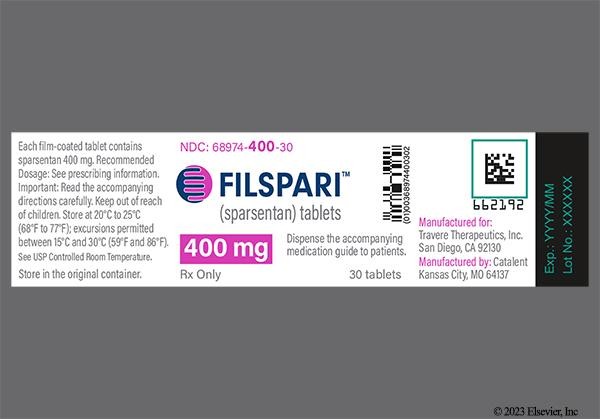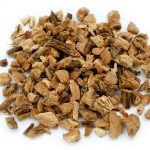
Contents
sparsentan
Immunoglobulin A nephropathy is a progressive kidney disease caused by a buildup of immunoglobulin A (IgA) deposits that inflame and scar the kidney. IgA is an antibody produced by the body to fight infections. In IgAN, IgA deposits in kidney damage glomeruli, the tiny functioning kidney units with looping blood vessels that filter wastes, resulting in blood and protein leakage in the urine and progressive loss of kidney function.
Sparsentan helps reduce protein leakage in urine by blocking endothelin-1 and angiotensin-II activity. Endothelin-1 is a peptide secreted by endothelial cells that line blood vessels, causing blood vessel constriction and increased blood pressure. Angiotensin II is a hormone that increases blood pressure and sodium retention in the kidneys.
Endothelin-1 and angiotensin-II contribute to inflammation and disease progression in IgA nephropathy by stimulating endothelin 1A receptors (ETAR) and angiotensin II type 1 (AT1R) receptors in the kidneys and vascular smooth muscles. Sparsentan selectively blocks endothelin 1A receptors (ETAR) and angiotensin II type 1 (AT1R) receptors, reducing inflammation and proteinuria.
Sparsentan was developed by combining irbesartan, an angiotensin II antagonist, and biphenylsulfonamide, an endothelin-1 antagonist. Initially developed for hypertension, sparsentan has been shown to effectively reduce proteinuria in IgA nephropathy and received accelerated approval from the FDA. Its effect on slowing down kidney function decline in IgAN patients, however, is yet to be established.
Warnings
- Avoid using sparsentan in pregnant women. Stop breastfeeding while on sparsentan treatment.
- Avoid concurrent use of sparsentan with renin-angiotensin-aldosterone system (RAAS) inhibitors, angiotensin receptor blockers (ARBs), endothelin receptor antagonists (ERAs), and aliskiren.
- Evaluate ALT, AST, and bilirubin levels before starting treatment and monitor monthly for the first 12 months and every 3 months after. Do not initiate sparsentan in patients with already elevated levels. Interrupt treatment in patients with signs of liver toxicity and withhold until levels return to normal. Discontinue treatment if clinical symptoms of hepatotoxicity occur.
- Advise patients to discontinue sparsentan and seek medical attention if they experience symptoms of hepatotoxicity.
QUESTION
What are the side effects of sparsentan?
Common side effects of sparsentan include:
- Swelling of extremities (peripheral edema)
- Low blood pressure (hypotension)
- Drop in blood pressure when standing up (orthostatic hypotension)
- Dizziness
- High blood potassium (hyperkalemia)
- Anemia
- Acute kidney injury
- Elevation of liver enzymes (transaminases)
Seek immediate medical attention if you experience any of the following symptoms or serious side effects:
- Fast or pounding heartbeats, fluttering in your chest, shortness of breath, sudden dizziness;
- Severe headache, confusion, slurred speech, severe weakness, vomiting, loss of coordination, feeling unsteady;
- Severe nervous system reaction with very stiff muscles, high fever, sweating, confusion, fast or uneven heartbeats, tremors, and feeling like you might pass out; or
- Severe eye symptoms include blurred vision, tunnel vision, eye pain or swelling, or seeing halos around lights.
This is not a complete list of all side effects or adverse reactions. Contact your doctor or report to the FDA at 1-800-FDA-1088 for medical advice.
What are the dosages of sparsentan?
Tablet
Adult:
IgA Nephropathy
- Indicated to reduce proteinuria in adults with primary immunoglobulin A nephropathy (IgAN; also known as Berger disease) at risk of rapid disease progression, generally with a urine protein-to-creatinine ratio (UPCR) ≥ 1.5 g/g
- Initial dose: 200 mg orally daily; after 14 days, increase to recommended dose of 400 mg daily, as tolerated
- When resuming treatment after interruption, consider starting at 200 mg/day, then increase to 400 mg/day after 14 days
Dosage Modifications
ALT/AST above 3 times up to 8 times upper limit of normal (ULN)
- Confirm elevation with repeat measure
- If confirmed, interrupt treatment and monitor ALT/AST levels, bilirubin, and INR until levels return to normal and patient is asymptomatic
- Do not resume treatment if any of the following occurs without other cause found: ALT/AST above 3 times ULN and total bilirubin above 2 times ULN or INR above 1.5; ALT/AST above 3 times ULN with symptoms of fatigue, nausea, vomiting, right upper quadrant pain, fever, rash, and/or eosinophilia; ALT/AST above 5 times ULN for longer than 2 weeks
ALT/AST above 8 times ULN
- Permanently discontinue treatment if no other cause found
Avoid coadministration of strong CYP3A4 inhibitors
- If use is unavoidable, interrupt sparsentan
- No clinically significant differences in pharmacokinetics observed in mild-to-moderate renal impairment (eGFR 30-89 mL/min/1.73 m2)
- Not studied in severe renal impairment
- Avoid use in mild, moderate, or severe hepatic impairment (Child-Pugh A-C) due to risk of serious liver injury
Dosing Considerations
- Verify non-pregnancy in females of reproductive potential and use effective contraception
- Measure ALT, AST, and bilirubin before initiating treatment and monthly for the first 12 months and every 3 months thereafter
- Discontinue renin-angiotensin-aldosterone system (RAAS) inhibitors, endothelin receptor antagonists (ERAs), and aliskiren
- Monitor ALT, AST, and bilirubin before treatment initiation, monthly for the first 12 months, and then every 3 months during treatment
- Verify non-pregnancy in females of reproductive potential monthly during treatment and 1 month after discontinuation
Pediatric:
Safety and efficacy not established
Overdose
No experience with sparsentan overdose. Doses up to 1600 mg/day in healthy volunteers and 400 mg/day in patients have been administered. Overdose may result in lower blood pressure and can be managed with supportive care.
What drugs interact with sparsentan?
Inform your doctor of all medications you are currently taking, who can advise you on any possible drug interactions. Never begin taking, suddenly discontinue, or change the dosage of any medication without your doctor’s recommendation.
- Severe drug interactions with sparsentan include: aliskiren, ambrisentan, aprocitentan, azilsartan, bosentan, candesartan, eprosartan, irbesartan, losartan, macitentan, olmesartan, sacubitril/valsartan, telmisartan, valsartan
It is important to always inform your doctor of all medications you use, as well as the dosage for each. For more information on drug interactions, consult the RxList Drug Interaction Checker.
By clicking Submit, I agree to the MedicineNet’s Terms & Conditions & Privacy Policy and understand that I may opt out of MedicineNet’s subscriptions at any time.
Pregnancy and breastfeeding
- Do not administer sparsentan to pregnant women as it can cause harm to the fetus.
- Women of childbearing age must use effective contraception before, during, and for one month after treatment.
- No information on sparsentan presence in breastmilk. Do not breastfeed while on sparsentan treatment due to potential adverse reactions in the infant, including low blood pressure (hypotension).
What else should I know about sparsentan?
- Take sparsentan as prescribed.
- Sparsentan is only available through a restricted program called FILSPARI REMS. Enrollment in the program is required before treatment initiation and compliance with monitoring requirements is essential.
- Regular blood tests and follow-up appointments are necessary.
- If experiencing symptoms of liver toxicity, discontinue sparsentan and seek medical attention.
- Keep sparsentan out of reach of children.
- In case of overdose, seek medical help or contact Poison Control.
From
Healthy Resources
Featured Centers
- What Are the Best PsA Treatments for You?
- Understanding Biologics
- 10 Things People With Depression Wish You Knew


